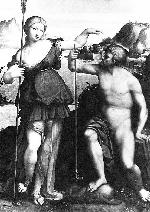 A new psychological study has confirmed
what many have been suspecting: the worship of celebrities has taken the place of religion in much of Western society.
A new psychological study has confirmed
what many have been suspecting: the worship of celebrities has taken the place of religion in much of Western society.
The study - conducted by both British and American psychologists - was conducted on a representative cross-section
of the British people.
The findings - published in the serious journal Personality and Individual Differences - have confirmed that the
lower a person's religious convictions the more likely they were to worship celebrities, and that the main way
to predict people's lack of interest in celebrities is if they had strong religious beliefs.

USA psychologist Lynn McCutcheon was the first to advance the idea that celebrity worship is replacing religious
belief. She states that so-called 'news' on TV and in the newspapers is often centred on the lives of celebrities,
and that the public are often more greatly influenced by what happens to their favourite star than by their real
life with family and friends.
In the UK the tremendous mass effect of the Princess Diana phenomenon has been confirmed by an Oxford University
study: suicide rates in the UK overwhelmingly increased following her death.
Meanwhile, the British media psychologist David Giles (in his book Illuminations of Immortality; a Psychology of
Fame and Celebrity) has suggested that one explanation for the new obsession with becoming famous is that it is
connected with the craving for immortality. Now that Heaven has become a questionable concept, the popular drive
is for Heaven on Earth, and in this new morality (or non-morality) all acts would be acceptable to achieve that
end, as they were to the ancient gods themselves (see article on METAMORPHOSES).
In this 21st Century Pantheon, David Beckham is the new Apollo.

